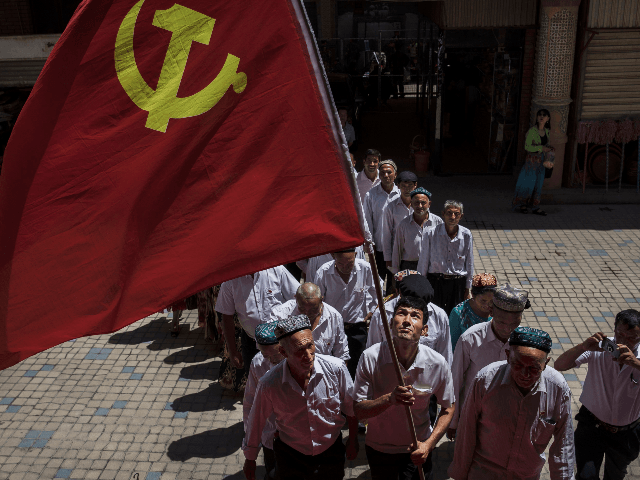The U.S.-based news organization Radio Free Asia (RFA) confirmed with Chinese officials this weekend that at least 13 people, believed to all be of Uyghur background, died in East Turkistan as a result of poisoning from “disinfecting” agents the Communist Party has flooded the region in as a form of pandemic response.
Much of East Turkistan, particularly the northern city of Ghulja, has been under a Chinese coronavirus lockdown since this summer, resulting in what is believed to be dozens of deaths of individuals who the government starved to death or blocked from accessing life-saving medicine. Uyghurs and other Turkic people in the region have accused the Han-dominated Communist Party of using the pandemic as an excuse to expand its genocidal intent and attempt to starve out entire communities, in addition to killing, torturing, sterilizing, and enslaving millions in the region since at least 2017.
The Central Asian region of East Turkistan, which China refers to as the “Xinjiang Uyghur Autonomous Region,” is home to a network of hundreds of concentration camps that Beijing claims are “vocational” schools. Survivors say they faced indoctrination, extreme torture, gang rape, slavery, testing consistent with live organ harvesting, and forced sterilization at the camps.
Local sources in Hotan, East Turkistan, told RFA in an article published Friday that the Communist Party had been aggressively spraying unknown chemicals in the region’s communities to allegedly “disinfect” areas confirming Chinese coronavirus cases.
A local official who wished to remain anonymous confirmed the deaths of “12 or 13” people in a village in Hotan after the chemicals were sprayed and acknowledged that he had personally lost a relative to the mass poisoning.
“The government sprayed disinfectants on the roofs and in the yards of each house to disinfect, and as a result, all of the residents passed out, and there was no one from the government to take them to the hospital,” an anonymous Uyghur man from Guma county, Hotan, confirmed to RFA. “There is nothing to eat, and the whole community has been knocked out by [authorities’] spraying the so-called disinfectant. We all don’t know what will happen tomorrow when we wake up.”
The man said his 24-year-old son had been arrested for refusing to allow the spraying, according to RFA.
In addition to door-to-door chemical sprays, some witnesses said they had seen aircraft spraying chemicals down into the community. None of the witnesses seemed to know exactly what chemicals they were being exposed to.
The vast majority of states have given up attempts to “disinfect” public spaces by spraying them down with chemicals, though the practice was visible in some countries, notably Peru, in 2020 – when scientists had yet to completely understand how the Chinese coronavirus spreads. Today, the World Health Organization (W.H.O.) heavily discourages such spraying.
“In outdoor spaces, large-scale spraying or fumigation in areas such as streets or open market places for the [Chinese coronavirus] or other pathogens is not recommended. Streets and sidewalks are not considered as routes of infection for [Chinese coronavirus],” the W.H.O. website advises. “Spraying disinfectants, even outdoors, can be noxious for people’s health and cause eye, respiratory or skin irritation or damage.”
The U.N. health agency adds that, in addition to potentially poisoning the public, spraying open areas with chemicals does not work because “the presence of dirt or rubbish for example, inactivates the disinfectant, and manual cleaning to physically remove all matter is not feasible. This is even less effective on porous surfaces such as sidewalks and unpaved walkways.”
The site also strongly warns, “Spraying of individuals with disinfectants (such as in a tunnel, cabinet, or chamber) is not recommended under any circumstances. This practice could be physically and psychologically harmful and would not reduce an infected person’s ability to spread the virus through droplets or contact.”
The “disinfectant” deaths follow reports of dozens killed by starvation or lack of medical care since July, when authorities began imposing mass house arrests on some of the most populous areas in East Turkistan. As of late September, RFA confirmed 22 deaths in Ghulja, East Turkistan, believed to be only a small percentage of the true toll given the deluge of panicked messages from Uyghurs and others in the area on social media demanding the government allow them to access food and medicine. Uyghurs in the diaspora relayed harrowing messages on Weibo, Douyin, and other highly censored Chinese social media outlets in which individuals trapped in East Turkistan displayed their starving children, their empty refrigerators, and, in some cases, the corpses of their loved ones trapped at home. Chinese censors initially attempted to erase the protest posts, but were overwhelmed and, in September, changed tactics to mass uploading innocuous posts and flooding the hashtags and topics used by those trapped with irrelevant information, drowning out the cries for help.
“There is no doubt that China is using the pretext of Covid lockdowns to deliberately murder Uyghurs and other Turkic peoples through forced starvation,” Salih Hudayar, the prime minister of the East Turkistan Government in Exile, said during a protest in Washington, DC, last month in response to the outcry from the Uyghur region. “Many reports have emerged from East Turkistan that the Chinese government is locking up Uyghurs and other Turkic peoples in their home and leaving them to starve.”

COMMENTS
Please let us know if you're having issues with commenting.